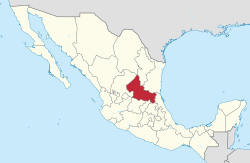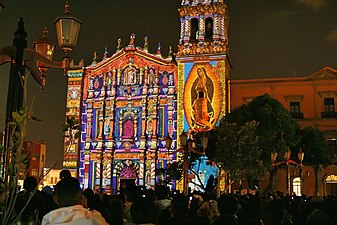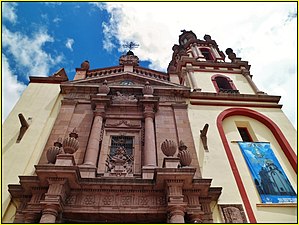Municipalities of San Luis Potosí

San Luis Potosí is a state in North Central Mexico that is divided into 59 municipalities. According to the 2020 Mexican census, it is the 19th most populated of Mexico's 31 states, with 2,822,255 inhabitants and the 15th largest by land area spanning 61,138.0 square kilometres (23,605.5 sq mi).[1][2] The largest municipality by population is the capital of San Luis Potosí, with 911,908 residents (32.31% of the state's total), while the smallest is Armadillo with 4,013 residents.[1] The largest municipality by land area is Santo Domingo which spans 4,322.60 km2 (1,669.0 sq mi), and the smallest is Huehuetlán with 71.50 km2 (27.61 sq mi).[2] The newest municipality is Villa de Pozos, established in 2024 from the municipality of San Luis Potosí;[3][4] followed by El Naranjo, created out of Ciudad del Maíz, and Matlapa, carved from Tamazunchale, both established in 1994.[5]
Municipalities in San Luis Potosi are administratively autonomous of the state according to the 115th article of the 1917 Constitution of Mexico.[6] Every three years, citizens elect a municipal president (Spanish: presidente municipal) by a plurality voting system who heads a concurrently elected municipal council (ayuntamiento) responsible for providing all the public services for their constituents. The municipal council consists of a variable number of trustees and councillors (regidores y síndicos).[7] Municipalities are responsible for public services (such as water and sewerage), street lighting, public safety, traffic, and the maintenance of public parks, gardens and cemeteries.[8] They may also assist the state and federal governments in education, emergency fire and medical services, environmental protection and maintenance of monuments and historical landmarks. Since 1984, they have had the power to collect property taxes and user fees, although more funds are obtained from the state and federal governments than from their own income.[8]
Municipalities
- Largest municipalities in San Luis Potosí by population
-
San Luis Potosí is the capital and most populous municipality in San Luis Potosí.
-
Soledad, second largest municipality by population in San Luis Potosí
-
Ciudad Valles is the third most populous municipality in San Luis Potosí.
-
Matehuala, fourth largest municipality by population
| Name | Municipal seat | Population (2020)[1] |
Population (2010)[9] |
Change | Land area[2] | Population density (2020) |
Incorporation date[5] | |
|---|---|---|---|---|---|---|---|---|
| km2 | sq mi | |||||||
| Ahualulco | Ahualulco | 18,974 | 18,644 | +1.8% | 775.4 | 299.4 | 24.5/km2 (63.4/sq mi) | October 29, 1823 |
| Alaquines | Alaquines | 7,785 | 8,186 | −4.9% | 586.2 | 226.3 | 13.3/km2 (34.4/sq mi) | July 19, 1826 |
| Aquismón | Aquismón | 48,359 | 47,423 | +2.0% | 794.2 | 306.6 | 60.9/km2 (157.7/sq mi) | July 19, 1826 |
| Armadillo | Armadillo de los Infante | 4,013 | 4,436 | −9.5% | 623.4 | 240.7 | 6.4/km2 (16.7/sq mi) | July 19, 1826 |
| Axtla[a] | Axtla de Terrazas | 32,544 | 33,245 | −2.1% | 191.2 | 73.8 | 170.2/km2 (440.8/sq mi) | July 19, 1826 |
| Cárdenas | Cárdenas | 18,317 | 18,937 | −3.3% | 390.5 | 150.8 | 46.9/km2 (121.5/sq mi) | November 16, 1920 |
| Catorce | Real de Catorce | 9,579 | 9,716 | −1.4% | 1,944.9 | 750.9 | 4.9/km2 (12.8/sq mi) | July 19, 1826 |
| Cedral | Cedral | 19,840 | 18,485 | +7.3% | 1,169.4 | 451.5 | 17.0/km2 (43.9/sq mi) | July 19, 1826 |
| Cerritos | Cerritos | 22,075 | 21,394 | +3.2% | 962.4 | 371.6 | 22.9/km2 (59.4/sq mi) | October 5, 1827 |
| Cerro de San Pedro | Cerro de San Pedro | 5,050 | 4,021 | +25.6% | 122.6 | 47.3 | 41.2/km2 (106.7/sq mi) | July 19, 1826 |
| Charcas | Charcas | 21,814 | 21,138 | +3.2% | 2,156.7 | 832.7 | 10.1/km2 (26.2/sq mi) | July 19, 1826 |
| Ciudad del Maíz[b] | Ciudad del Maíz | 30,320 | 31,323 | −3.2% | 3,150.4 | 1,216.4 | 9.6/km2 (24.9/sq mi) | July 19, 1826 |
| Ciudad Fernández [c] | Ciudad Fernández | 48,106 | 43,528 | +10.5% | 518.4 | 200.2 | 92.8/km2 (240.3/sq mi) | July 19, 1826 |
| Ciudad Valles[d] | Ciudad Valles | 179,371 | 167,713 | +7.0% | 2,423.6 | 935.8 | 74.0/km2 (191.7/sq mi) | July 19, 1826 |
| Coxcatlán | Coxcatlán | 15,660 | 17,015 | −8.0% | 90.9 | 35.1 | 172.3/km2 (446.2/sq mi) | July 19, 1826 |
| Ébano | Ébano | 40,899 | 41,529 | −1.5% | 698.5 | 269.7 | 58.6/km2 (151.7/sq mi) | June 6, 1963 |
| El Naranjo | El Naranjo | 20,959 | 20,495 | +2.3% | 821.3 | 317.1 | 25.5/km2 (66.1/sq mi) | December 2, 1994 |
| Guadalcázar | Guadalcázar | 25,119 | 25,985 | −3.3% | 3,745.9 | 1,446.3 | 6.7/km2 (17.4/sq mi) | July 19, 1826 |
| Huehuetlán[e] | Huehuetlán | 15,334 | 15,311 | +0.2% | 71.5 | 27.6 | 214.5/km2 (555.5/sq mi) | July 19, 1826 |
| Lagunillas | Lagunillas | 5,453 | 5,774 | −5.6% | 535.5 | 206.8 | 10.2/km2 (26.4/sq mi) | October 5, 1827 |
| Matehuala | Matehuala | 102,199 | 91,522 | +11.7% | 1,301.7 | 502.6 | 78.5/km2 (203.3/sq mi) | July 19, 1826 |
| Matlapa | Matlapa | 28,996 | 30,299 | −4.3% | 117.2 | 45.3 | 247.4/km2 (640.8/sq mi) | December 2, 1994 |
| Mexquitic[f] | Mexquitic de Carmona | 58,469 | 53,442 | +9.4% | 877.1 | 338.7 | 66.7/km2 (172.7/sq mi) | July 19, 1826 |
| Moctezuma[g] | Moctezuma | 19,036 | 19,327 | −1.5% | 1,291.5 | 498.7 | 14.7/km2 (38.2/sq mi) | July 19, 1826 |
| Rayón[h] | Rayón | 15,301 | 15,707 | −2.6% | 786.4 | 303.6 | 19.5/km2 (50.4/sq mi) | July 19, 1826 |
| Rioverde | Rioverde | 97,943 | 91,924 | +6.5% | 3,064.0 | 1,183.0 | 32.0/km2 (82.8/sq mi) | July 19, 1826 |
| Salinas | Salinas de Hidalgo | 31,107 | 30,190 | +3.0% | 1,729.9 | 667.9 | 18.0/km2 (46.6/sq mi) | July 19, 1826 |
| San Antonio[i] | San Antonio | 9,382 | 9,390 | −0.1% | 94.7 | 36.6 | 99.1/km2 (256.6/sq mi) | July 19, 1826 |
| San Ciro | San Ciro de Acosta | 10,215 | 10,171 | +0.4% | 639.2 | 246.8 | 16.0/km2 (41.4/sq mi) | February 16, 1853 |
| San Luis Potosí | San Luis Potosí† | 911,908 | 772,604 | +18.0% | 1,482.0 | 572.2 | 615.3/km2 (1,593.7/sq mi) | July 19, 1826 |
| San Martín Chalchicuautla | San Martín Chalchicuautla | 18,468 | 21,347 | −13.5% | 413.1 | 159.5 | 44.7/km2 (115.8/sq mi) | July 19, 1826 |
| San Nicolás Tolentino | San Nicolás Tolentino | 4,779 | 5,466 | −12.6% | 692.4 | 267.3 | 6.9/km2 (17.9/sq mi) | July 19, 1826 |
| Santa Catarina | Santa Catarina | 12,163 | 11,835 | +2.8% | 640.6 | 247.3 | 19.0/km2 (49.2/sq mi) | November 6, 1876 |
| Santa María del Río | Santa María del Río | 39,880 | 40,326 | −1.1% | 1,701.0 | 656.8 | 23.4/km2 (60.7/sq mi) | July 19, 1826 |
| Santo Domingo | Santo Domingo | 10,785 | 12,043 | −10.4% | 4,322.6 | 1,669.0 | 2.5/km2 (6.5/sq mi) | December 24, 1857 |
| Soledad | Soledad de Graciano Sánchez | 332,072 | 267,839 | +24.0% | 305.7 | 118.0 | 1,086.3/km2 (2,813.4/sq mi) | July 19, 1826 |
| Tamasopo[j] | Tamasopo | 29,184 | 28,848 | +1.2% | 1,322.9 | 510.8 | 22.1/km2 (57.1/sq mi) | July 19, 1826 |
| Tamazunchale | Tamazunchale | 95,037 | 96,820 | −1.8% | 353.7 | 136.6 | 268.7/km2 (695.9/sq mi) | July 19, 1826 |
| Tampacán | Tampacán | 14,348 | 15,838 | −9.4% | 187.3 | 72.3 | 76.6/km2 (198.4/sq mi) | December 14, 1861 |
| Tampamolón | Tampamolón Corona | 13,603 | 14,274 | −4.7% | 262.7 | 101.4 | 51.8/km2 (134.1/sq mi) | July 19, 1826 |
| Tamuín | Tamuín | 36,968 | 37,956 | −2.6% | 1,843.3 | 711.7 | 20.1/km2 (51.9/sq mi) | July 19, 1826 |
| Tancanhuitz[k] | Tancanhuitz de Santos | 20,300 | 21,039 | −3.5% | 137.4 | 53.1 | 147.7/km2 (382.7/sq mi) | July 19, 1826 |
| Tancuayalab | San Vicente Tancuayalab | 14,945 | 14,958 | −0.1% | 518.7 | 200.3 | 28.8/km2 (74.6/sq mi) | July 19, 1826 |
| Tanlajás | Tanlajás | 18,208 | 19,312 | −5.7% | 374.8 | 144.7 | 48.6/km2 (125.8/sq mi) | July 19, 1826 |
| Tanquián | Tanquián de Escobedo | 13,448 | 14,382 | −6.5% | 143.4 | 55.4 | 93.8/km2 (242.9/sq mi) | November 26, 1870 |
| Tierra Nueva[l] | Tierra Nueva | 7,966 | 9,024 | −11.7% | 478.6 | 184.8 | 16.6/km2 (43.1/sq mi) | July 19, 1826 |
| Vanegas | Vanegas | 7,557 | 7,902 | −4.4% | 2,799.5 | 1,080.9 | 2.7/km2 (7.0/sq mi) | November 10, 1922 |
| Venado | Venado | 14,188 | 14,492 | −2.1% | 1,301.0 | 502.3 | 10.9/km2 (28.2/sq mi) | July 19, 1826 |
| Villa de Arista[m] | Villa de Arista | 17,258 | 15,528 | +11.1% | 586.7 | 226.5 | 29.4/km2 (76.2/sq mi) | October 13, 1857 |
| Villa de Arriaga | Villa de Arriaga | 18,206 | 16,316 | +11.6% | 878.1 | 339.0 | 20.7/km2 (53.7/sq mi) | May 7, 1874 |
| Villa de Guadalupe | Villa de Guadalupe | 9,277 | 9,779 | −5.1% | 1,912.4 | 738.4 | 4.9/km2 (12.6/sq mi) | December 17, 1857 |
| Villa de La Paz | Villa de La Paz | 5,298 | 5,350 | −1.0% | 143.8 | 55.5 | 36.8/km2 (95.4/sq mi) | May 31, 1921 |
| Villa de Pozos[n] | Villa de Pozos | — | — | — | — | — | — | July 22, 2024 |
| Villa de Ramos | Villa de Ramos | 38,389 | 37,928 | +1.2% | 2,492.2 | 962.2 | 15.4/km2 (39.9/sq mi) | July 19, 1826 |
| Villa de Reyes[o] | Villa de Reyes | 52,912 | 46,898 | +12.8% | 1,019.9 | 393.8 | 51.9/km2 (134.4/sq mi) | July 19, 1826 |
| Villa Hidalgo[p] | Villa Hidalgo | 15,458 | 14,876 | +3.9% | 1,496.5 | 577.8 | 10.3/km2 (26.8/sq mi) | July 19, 1826 |
| Villa Juárez[q] | Villa Juárez | 10,304 | 10,174 | +1.3% | 640.1 | 247.1 | 16.1/km2 (41.7/sq mi) | September 26, 1829 |
| Xilitla | Xilitla | 49,741 | 51,498 | −3.4% | 398.6 | 153.9 | 124.8/km2 (323.2/sq mi) | July 19, 1826 |
| Zaragoza | Villa de Zaragoza | 27,386 | 24,596 | +11.3% | 614.2 | 237.1 | 44.6/km2 (115.5/sq mi) | November 3, 1882 |
| San Luis Potosí | — | 2,822,255 | 2,585,518 | +9.2% | 61,138.0 | 23,605.5 | 46.2/km2 (119.6/sq mi) | — |
| Mexico | — | 126,014,024 | 112,336,538 | +12.2% | 1,960,646.7 | 757,010 | 64.3/km2 (166.5/sq mi) | — |
Notes
- ^ Axtla was named Villa Alfredo M. Terrazas from 1932 to 1981.[5]
- ^ Ciudad del Maíz was originally incorporated as Valle del Maíz, changing its name on April 26, 1830.[5]
- ^ Ciudad Fernández was originally incorporated as Villa de Santa Elena, changing its name on September 4, 1828. The municipality was absorbed into Ríoverde from 1944 to 1958.[5]
- ^ Ciudad Valles was originally incorporated as Villa de Valles, changing its name on April 26, 1830.[5]
- ^ Huehuetlán was absorbed into Tancanhuitz from 1946 to 1955.[5]
- ^ Mexquitic was originally incorporated as San Miguel Mezquitic, changing its name on November 1, 1917.[5]
- ^ Moctezuma was originally incorporated as Hedionda, changing its name on January 22, 1863.[5]
- ^ Rayón was originally incorporated as Gamotes, changing its name on June 10, 1868.[5]
- ^ San Antonio was absorbed into Tampamolón from 1944 to 1948.[5]
- ^ Tamasopo was originally incorporated as Palma, changing its name on December 6, 1932.[5]
- ^ Tancanhuitz was known as Ciudad Santos from 1932 to 1981.[5]
- ^ Tierra Nueva was absorbed into Santa María del Río from 1946 to 1950.[5]
- ^ Villa de Arista was absorbed into Villa Hidalgo from 1946 to 1971.[5]
- ^ The municipality of Villa de Pozos was created from the borough (delegación) of the same name in the municipality of San Luis Potosí on July 22, 2024,[3][4] and this change is not included in the 2020 or 2010 census figures. The population of Villa de Pozos is 148,165 as of the 2020 census,[10] and its area is 147.79 square kilometres (57.06 sq mi).[3] Villa de Pozos had previously been a municipality from 1826 to 1946.[5]
- ^ Villa de Reyes was originally incorporated as Valle de San Francisco, changing its name on May 16, 1862.[5]
- ^ Villa Hidalgo was originally incorporated as Iturbide, changing its name on January 3, 1927.[5]
- ^ Villa Juárez was originally incorporated as Santa Gertrudis de la Carbonera, changing its name to Carbonera on 1859 and to its current name on November 6, 1928.[5]
References
- ^ a b c "Censo de Población y Vivienda 2020 – SCITEL" [Population and Housing Census 2020] (in Spanish). Mexico: INEGI. Retrieved January 27, 2021.
- ^ a b c "México en cifras – Medio Ambiente" [Mexico in figures – Environment] (in Spanish). Mexico: INEGI. Retrieved February 12, 2021.
- ^ a b c "Decreto 1074" (PDF). Plan de San Luis (in Spanish). General Secretariat of Government, San Luis Potosí. July 22, 2024. Retrieved January 3, 2025.
- ^ a b Rocha, Raymundo (July 22, 2024). "Villa de Pozos: ¿quién y cómo se gobernará en el nuevo municipio de SLP?" (in Spanish). El Sol de San Luis. Retrieved January 3, 2025.
- ^ a b c d e f g h i j k l m n o p q r s Estado de San Luis Potosí División Territorial de 1810 a 1995 [State of San Luis Potosí Territorial Division from 1810 to 1995] (PDF) (in Spanish). Mexico: INEGI. 1996. ISBN 978-970-13-1511-8.
- ^ Constitución Política de los Estados Unidos Mexicanos [Political Constitution of the United Mexican States] (Article 115) (in Spanish). 1917. Retrieved September 27, 2017.
- ^ OECD (November 12, 2004). New Forms of Governance for Economic Development. OECD Publishing. p. 121. ISBN 978-92-64-01532-6.
- ^ a b Mexico Company Laws and Regulations Handbook. International Business Publications. 2009. p. 42. ISBN 978-1-4330-7030-3.
- ^ "Censo de Población y Vivienda 2010 – SCITEL" [Population and Housing Census 2010] (in Spanish). Mexico: INEGI. Retrieved January 27, 2021.
- ^ "Solicitud de Municipalización de Villa de Pozos S.L.P." (PDF) (in Spanish). Congress of San Luis Potosí. May 22, 2023. Retrieved January 3, 2025.



